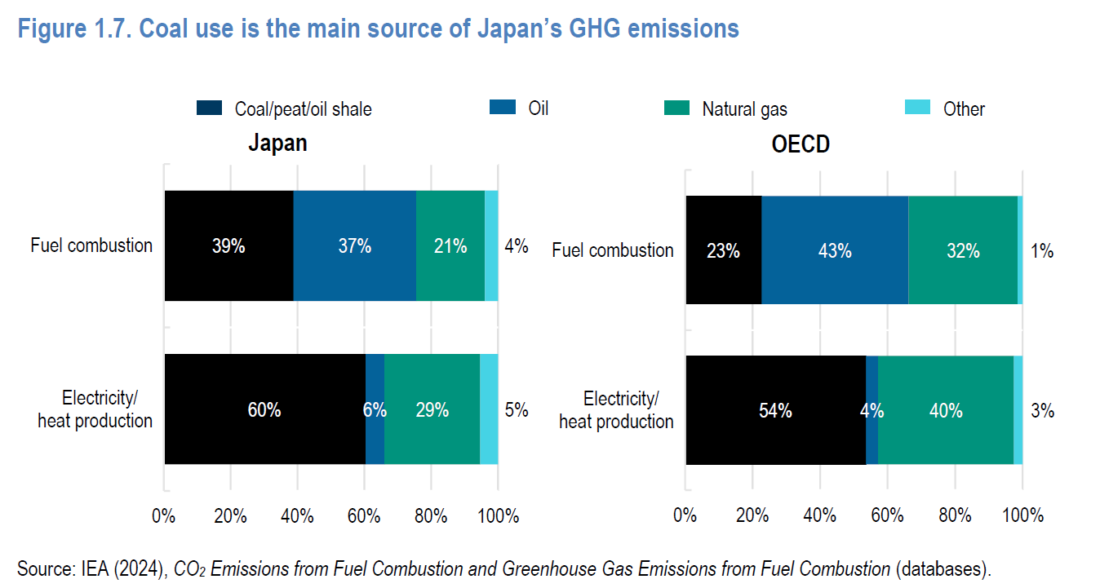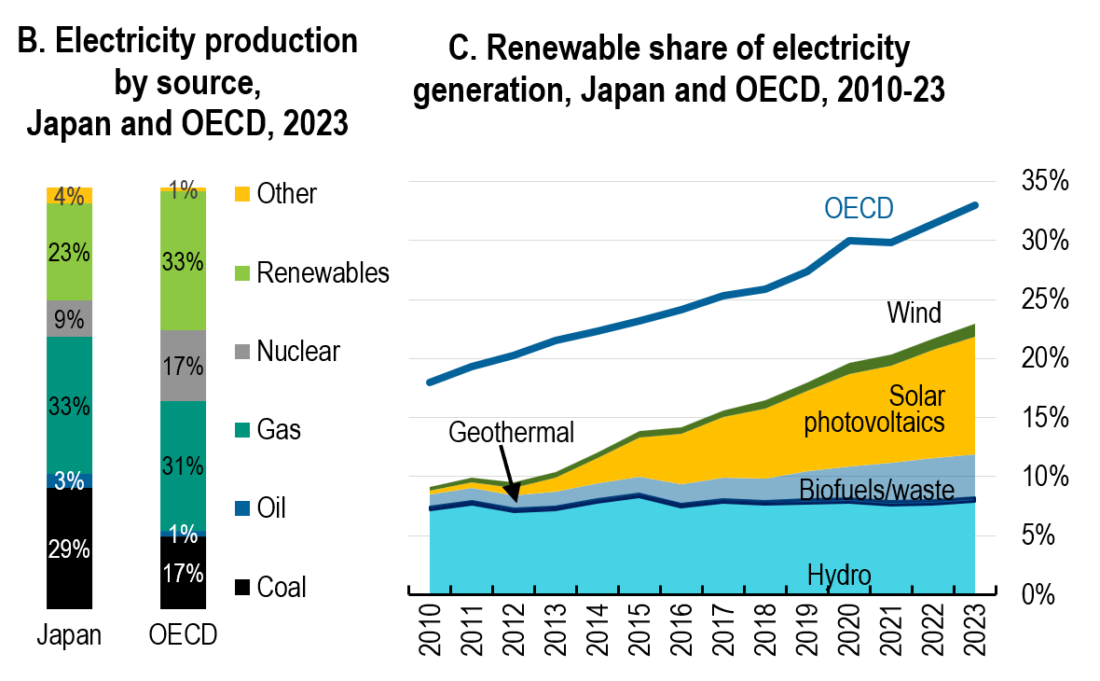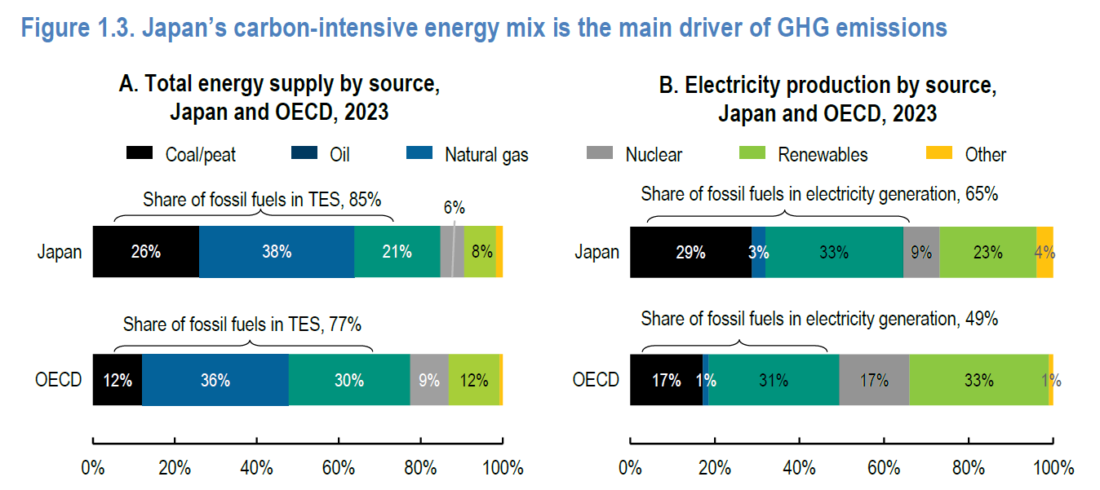On March 21, 2025, the OECD published the report OECD Environmental Performance Reviews: Japan 2025, an analysis of Japan’s current policies and future targets on a number of environmental issues, including climate and energy. The principal aim of the OECD Environmental Performance Review program is to help member and partner countries improve their performance in environmental management. This is the fourth time Japan has been the subject of a review, and the first time since 2010.
Notably, the OECD clearly states that phasing out coal-fired power is essential for Japan to “get on track to net zero”, a significant contrast from the Japanese government’s assertion that Japan’s reductions are on track. It also points out the many uncertainties related to hydrogen/ammonia co-firing and CCS, and that Japan’s share of renewable energy in the energy mix is lower than the average of other OECD countries. Detailed analysis of each of these points concludes with a call for immediate action.
Coal-fired power generation must be phased-out
In its analysis, the OECD clearly states that “a clear pathway towards phasing out unabated coal power is imperative to get on track to net zero”. The report points out that, in 2023, the ratio of coal in Japan’s total energy supply was more than double the average in the OECD, and accounted for 39% of the country’s energy-related GHG emissions in 2023.

Additionally, concern is expressed about coal’s key role in Japan’s future energy mix, and it is pointed out that Japan’s planned share of coal in 2030 (19%) is higher than the OECD average in 2023.
The report brings up Japan’s 2024 commitment as a G7 country to phase out unabated coal power generation during the first half of the 2030s, or in a timeline consistent with the Paris Agreement goal and in line with countries’ net-zero pathways, and recommends formalizing this pledge by developing a roadmap to phase out unabated coal power on a timeline consistent with the Paris Agreement, as well as following through with the announced 2030 phase-out of inefficient coal-fired power plants.
“Considerable uncertainties” around hydrogen/ammonia co-firing and CCS
Uncertainties about Japan’s decarbonization strategy are emphasized in OECD’s analysis, particularly regarding the reliance on hydrogen/ammonia co-firing and carbon capture and storage (CCS) technologies to meet climate targets. It is pointed out that, compared to mature renewables technology, low-emission hydrogen/ammonia and CCS technologies remain at early stages of deployment and are more expensive. It also cites “considerable uncertainties” about the scope for scaling up these technologies in a cost-effective manner, mentioning that the expected high reliance on coal and gas will weaken Japan’s ability to reach net zero.
Additionally, the report underlines that today nearly all hydrogen and ammonia worldwide is produced from unabated fossil fuels. Co-firing would likely lead to higher life cycle CO2 emissions in the short term compared with coal-only combustion, and retrofitting thermal power plants could lead to carbon lock-in. It therefore recommends that Japan consider prioritizing the use of low-emission hydrogen and ammonia and CCS in sectors where other emission reduction options are limited and where these technologies would be the most cost-effective option, such as for hard-to-abate industrial processes (e.g. chemicals, iron and steel).
Ratio of renewables in Japan’s energy mix “below average”
The report points out that the role of renewables in power generation in Japan has increased in recent years, but the ratio of renewables remains at only around two-thirds of the OECD average. Meanwhile, fossil fuels, including coal, still accounted for nearly two-thirds of Japan’s power generation in 2023, compared to 49% on average in the OECD.

87% of Japan’s GHG emissions were linked to energy production and use in 2022 – the highest share in the OECD – and energy industries are the largest single source of emissions. The expected contribution of fossil fuels to Japan’s power generation in FY2030 (41%) is larger than that of most OECD countries in 2023.
The analysis states clearly that Japan, the second-largest GHG emitter in the OECD, must accelerate its GHG emission reductions. The FY2030 target represents a 34% reduction in net GHG emissions compared to 2019 levels, but the Intergovernmental Panel on Climate Change (IPCC) has called for a global emission reduction of 43% by that time to align with the Paris Agreement’s 1.5°C temperature limit. The OECD states that Japan is one of the countries expected to lead this global effort, but that there are uncertainties regarding the ability of Japan to meet its climate targets with its current policies due to the country’s high reliance on fossil fuels and low energy self-sufficiency.

The review makes a number of concrete recommendations, such as developing alternative net-zero energy mix scenarios to 2050 that include intermediate milestones and reflect technology, market, and social uncertainties. Another is developing a climate mitigation planning framework based on binding periodic carbon budgets (setting limits on national and/or sectoral emissions) and an independent advisory body to ensure that its current and planned measures are aligned with the long-term targets. Several OECD countries have adopted such an approach, including France, Germany and the United Kingdom.
Urgent action is needed
The report highlights that the impacts of climate change are being felt in Japan, as more extreme weather conditions intensify Japan’s exposure to hazards such as tropical cyclones, storm surges and floods. Over 60% of the population is exposed to hot summer days with temperatures above 35°C, and the health impact has been evident, with growing numbers of heat-related illnesses and fatalities.
Ambitious climate targets, concrete roadmaps, and decisive action by the government are needed to not only align with the rest of the OECD, but to make Japan the climate leader it is expected to be. This includes a rapid phase-out of coal-fired power consistent with international commitments to limit the global temperature rise to 1.5℃.
*Note: The research for this review was conducted until December 2024, before the passage of the revised Plan for Global Warming Countermeasures, 7th Strategic Energy Plan, and GX2040 Vision in February 2025, which set climate and energy strategies and targets for 2035 and 2040, respectively.
Report Download
OECD Environmental Performance Reviews: Japan 2025(Link)
Reference:
IGES: Launch of the OECD Environmental Performance Review of Japan: Presentation Materials(Link)
Related Articles:
【News】 Cabinet approves 7th Strategic Energy Plan, Plan for Global Warming Countermeasures, and GX2040 Vision
Written/Published by: Organisation for Economic Co-operation and Development (OECD)
Published: March 21, 2025
